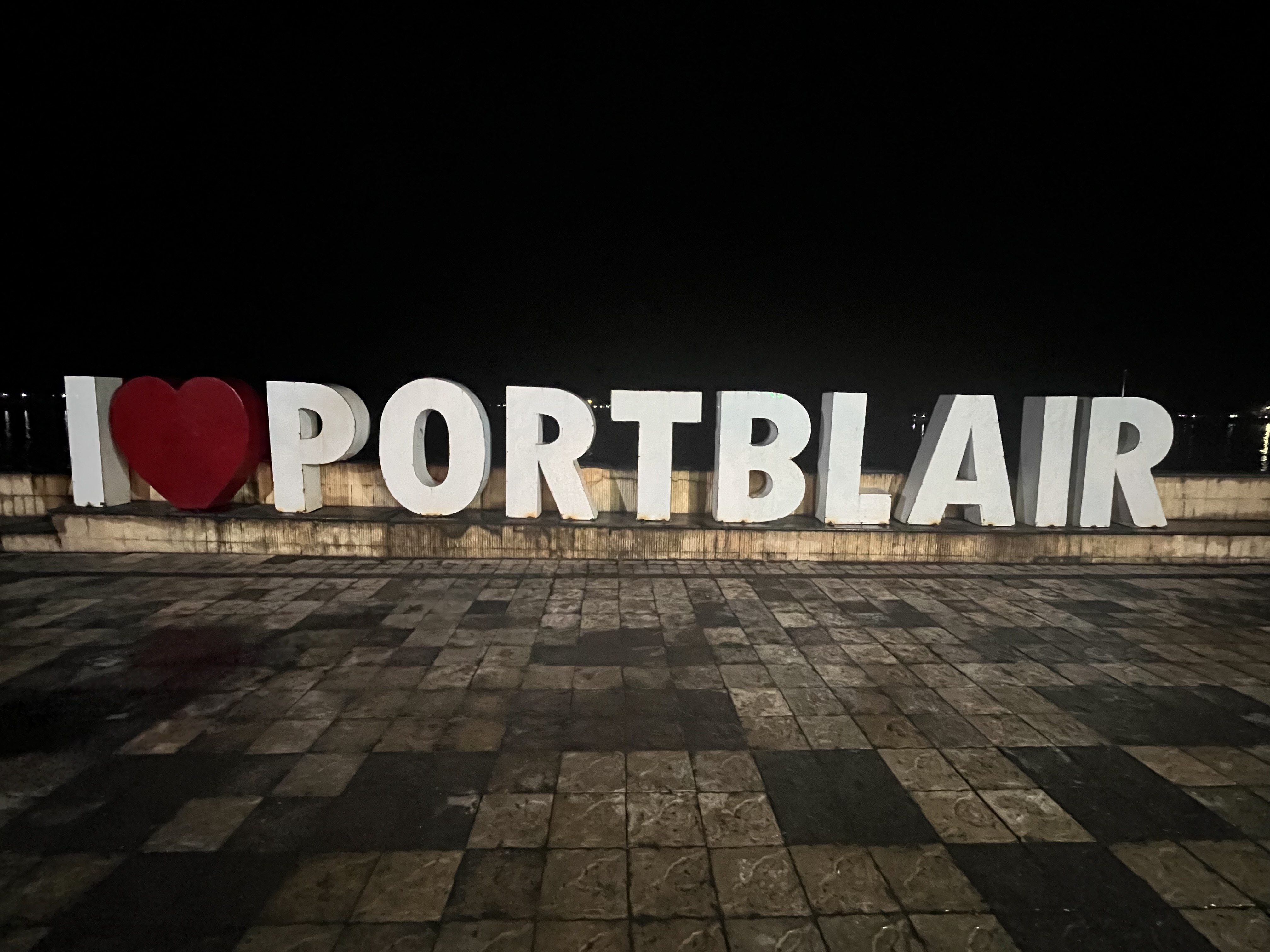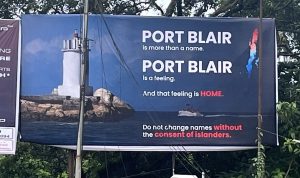Across the capital city of the Andaman and Nicobar Islands, a striking new banner occupied every prominent space. Next to roads lined with potholes, it read: “Port Blair is more than a name. Port Blair is a feeling. And that feeling is home.” Beneath this, another message stood out: “Do not change names without the consent of the islanders.” The words “home” and “without the consent of the islanders” are highlighted in crimson.
Although no individual or group has come forward to claim responsibility for the banner, it has quickly become a symbol of resistance among the islanders.
The banner is a response to the Indian government’s swift decision to change the name of the island capital, long known as Port Blair, to Sri Vijaya Puram. On September 13, Indian Home Minister Amit Shah rechristened the capital via an post on X, which was subsequently reposted by Prime Minister Narendra Modi. The news stunned the islanders, as they were never notified.
Since the Bharatiya Janata Party rose to power in 2014, the union government has turned its gaze toward the Andaman and Nicobar Islands, long viewed as a security outpost. Development projects, aimed at countering China’s presence in the Indian Ocean, are now mushrooming across the island chain. However, the historical context invoked by Shah’s announcement of the new name is distorted.
Flawed Historical Understanding
The renaming of Port Blair to Sri Vijaya Puram is intended to symbolize India’s victory over British colonial rule, while emphasizing the historical influence of the ancient Chola Empire in the region.
Yet Srivijaya (or Sriwijaya) was a maritime empire based in Sumatra which flourished between the 7th and 11th centuries in Southeast Asia. It had no direct links to the Andaman Islands, which were outside the empire’s sphere of influence.
In the 11th century, the Chola king Rajendra I launched an expedition against Srivijaya – an unusual move, given India’s typically cordial relations with Southeast Asia. Due to scant historical sources, the reasons behind the move can only be speculated upon.
Nilakanta Sastri’s book “The Colas” outlines two explanations for the attack. One suggests Rajendra I sought to expand his global conquest, or Digvijaya, while the other posits a response to Srivijaya’s interference in trade between China and the Cholas. Citing Chinese texts and Tamil inscriptions from Southern India, Myanmar, Malaya, and South China, historians like Tansen Sen and Himanshu Prabha Ray affirm the latter as the main driver of conflict.
Yet these historical records reveal that the Chola expeditions were confined to the Nicobar group of islands, not the Andamans. The Nicobars, referred to as Nakkavaram or Ma Nakkavaram, were used for rest, replenishment, and repair – not as a naval base.
Aparna Vaidik, a professor of history at Ashoka University, India, argues that the renaming reflects a skewed interpretation of history. She points to the work of Purushottam Nagesh Oak, whose writings popularized the idea of a grand Hindu empire, an idea now being used to propagate the government’s nationalist agenda in the guise of decolonization.
“History is often written to fulfill the needs of the present. And currently, they need this narrative to fulfill the larger part of their aspirations,” said Vaidik. “The nationalist idea they are propagating is creating a popular misconception. It was the British colonization that integrated the islands into India, not the Cholas.
“The move is not just erasing the colonial name but also the identity of the islanders.”
Why the Locals Defend a Colonial Name
Though the government touts the new name as the totem of India’s freedom struggle, the descendants of the colonial convicts think otherwise. Port Blair was named after Archibald Blair, a British naval surveyor and lieutenant who surveyed these islands and assessed their feasibility for settlement. The Local-Born Association, a community of convict descendants, opined that the honor conferred to him should’ve been retained.
“We are still using the route map that was prepared by Blair, so why should we take away his credit? Besides, the name Port Blair was unique to us. Even in its literal meaning, Blair – meaning battlefield – is apt, said Rakesh Pal Gobind, president of the Local-Born Association. “The Home Minister says the city played a major role in the independence struggle, so the name is relevant in its literal sense.”
Gobind also said that locals were neither consulted nor informed about the renaming. He stated that the locals are not against changing names but instead against the imposition.
“The government could’ve renamed the islands to any freedom fighter who had served their sentence in the islands. We didn’t oppose the previous names that were given to the other islands because of their historical significance for us. But we don’t feel any connection with the new name; we don’t identify with it,” he said.
“Our forefathers had shed their blood to make these islands what they are now, and if today we have to search for our identity in our own hometown, isn’t it injustice?”
Misplaced Priorities
This isn’t the first renaming in the islands’ recent memory; in 2018, three islands were renamed to erase colonial legacy: Ross, Neil, and Havelock became Netaji Subhash Chandra Bose, Shaheed Dweep, and Swaraj Dweep, respectively. Despite using the same alibi, the union government’s decision is ringing hollow for islanders today. For many, the name change feels like a distraction from more pressing issues.
“What use is the new name if we have to deal with the same old problems? The electricity is gone for more than 8-10 hours every day; water comes once every 10 days. What do we do with the new name?,” complained Phoolwati, a grocer in South Andaman.
The islanders have long been plagued by irregular power, water shortages, poor transport, and unemployment, among many other issues. In December 2023, hotel staffers, locals, and tour operators in Swaraj Dweep staged protests demanding a reliable power supply during peak tourist season.
“The islands’ tourism sector has been facing a loss for the past 10 years. Even now we are not provided constant power supply during peak tourist season, roads are damaged and lined with potholes, and unemployment is on the rise among the youth due to this,” said a local tour operator based in the island capital. “Why aren’t they focusing on these? These are things that they should be changing. Instead, the government is busy changing an already-established name.”
Tourism, the backbone of the islands’ economy, has also taken a hit. For decades, Port Blair was a name synonymous with the islands’ rich history and natural beauty. Many in the tourism sector now fear that the new name will sever this crucial link.
“Port Blair was not just a name; it was a brand,” said the tour operator. “The tourism sector has relied on this name to promote the islands’ tourism and history to the world. This has been our identity for a very long time. Now, how do we form a connection to the new name?”

The capital’s “I Heart Port Blair” sign, as seen on the day the city’s name was changed to Sri Vijaya Puram, Sept. 13, 2024. Photo by Leesha K Nair.
The Islands Amid China’s Malacca Dilemma
After years of inertia, India has been strengthening its military presence on the islands. The islands are home to India’s only tri-service command – the Andaman and Nicobar Command (ANC) – which provides India with a strategic counterbalance to Chinese activities in the region. Plans to upgrade the military infrastructure of the islands are already underway, including modernizing airfields, improving logistics and personnel accommodations, and enhancing monitoring systems. The government is also building related infrastructure, such as a container transshipment terminal on the Great Nicobar Islands, to facilitate operations.
The Islands sit at a strategic chokepoint. Nearly 90 percent of Chinese trade passes through the sea, and over 80 percent of China’s oil imports pass through the narrow passage of the Malacca Strait. The vulnerability of this route has given rise to what is commonly referred to as China’s “Malacca Dilemma.” In the event of conflict, this maritime artery could easily be blocked by rival nations. Lacking viable alternatives, China has been steadily expanding its military presence in the Indian Ocean Region.
Chinese naval and survey vessels have repeatedly entered India’s Exclusive Economic Zone near the Andaman and Nicobar Islands without permission. Moreover, the People’s Liberation Army Navy has ramped up anti-piracy operations in the Gulf of Aden, while China allegedly maintains an intelligence base on Myanmar’s Coco Islands, which lie just 55 kilometers north of the Indian islands. In a 2016 diplomatic exchange in New Delhi, a Chinese ambassador also hinted at the potential future contestation of the Andaman and Nicobar Islands, which has further heightened India’s security concerns.
Kanti Prasad Bajpai, Wilmar professor of Asian Studies at the Lee Kuan Yew School of Public Policy, Singapore, suggested that the renaming of Port Blair is also a signal of India’s growing strategic resolve in the Bay of Bengal. But he cautioned against overestimating the islands’ military significance due to their remoteness and supply constraints.
“The islands are vulnerable to Chinese attack, for instance, from an aircraft carrier battle group. But it is also important not to exaggerate how useful or important the islands would be for the country. In the foreseeable future, it is likely not going to be of great military significance,” said Bajpai.
He drew parallels to Chinese bases in East Africa and the Indian Ocean, noting that their distance from China makes them equally susceptible to attack by India.
Growing Calls for Autonomy
The recent renaming proposal was drafted by a 16-member committee, of which 10 were non-islander bureaucrats deployed in the islands. Calls for greater local autonomy have resurfaced in the wake of the renaming, including the restoration of the abolished committee of elected representatives, called the Pradesh Council. The Andaman and Nicobar Islands are one of India’s eight union territories (UTs), governed by an appointed lieutenant governor. It comes under the Home Ministry’s direct control. Unlike UTs with partial statehood, such as Delhi and Puducherry, the islands lack an elected government.
“I would take the decisions of my own home. Why would I ask someone staying in Delhi? Why should the bureaucrats be given this right to change the name? They don’t have to stay here forever,” said Gobind.
While islanders continue to voice their concerns, India remains focused on its geopolitical and military ambitions. The approval of projects like the transshipment port in Great Nicobar and offshore drilling for oil, despite the deep socio-ecological costs, underscores the government’s determination to assert itself as a dominant force in the Indian Ocean.
As of this writing, the banners of resistance – the many signs declaring “Port Blair is more than a name” – are being torn down, making way for tourism ads featuring the new name. Islanders are left wondering about their place in this larger strategy.

































